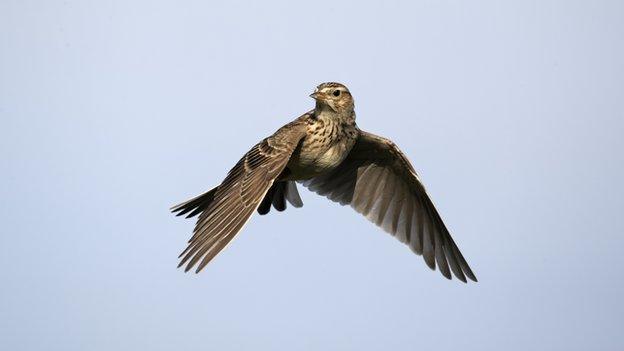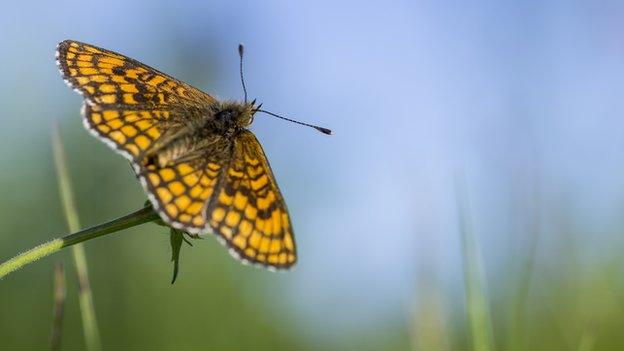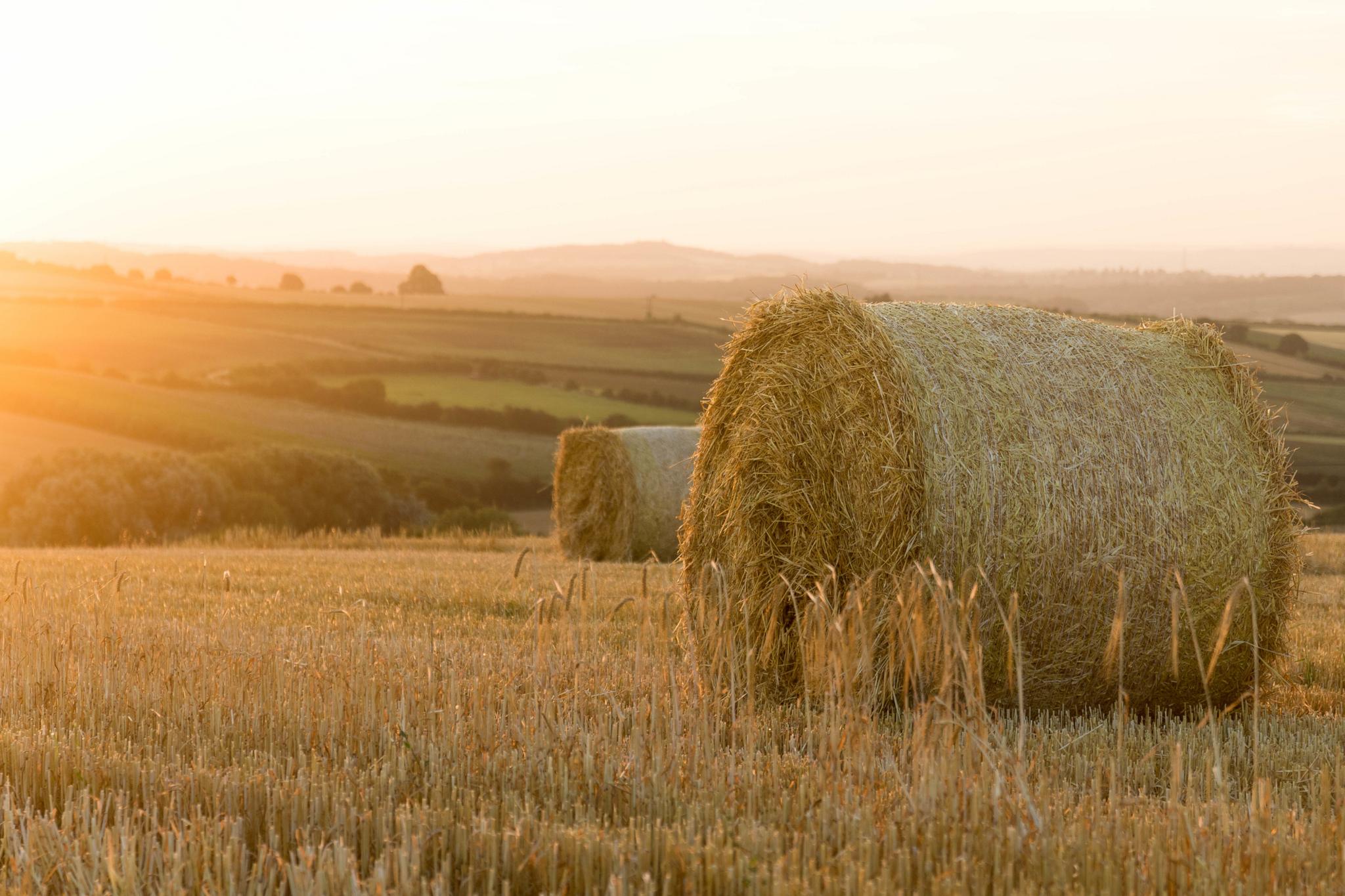Nature loss linked to farming intensity
- Published

Skylark numbers have fallen by 60% since the 1970s
More than 50 conservation groups say the "policy-driven" intensification of farming is a significant driver of nature loss in the UK.
The State of Nature report assessed 8,000 UK species and found that one in 10 are threatened with extinction.
More than half of farmland birds (56%) including the turtle dove and corn bunting are in danger of extinction.
The National Farmers Union said the report ignored progress made by farmers on conservation in the last 25 years.
Mark Eaton is the lead author of the paper. He said: "We now know that farming practices over recent decades have had the single largest impact on the UK's wildlife.
"The great majority of that impact has been negative. This isn't deliberate, it is a by-product of changes in farming to make it more efficient."
'Squeezed out'
"There have been big changes in farming which has made it much more efficient. This is great for putting food on the table. But nature has been squeezed out. Our research for the first time has quantified that."
Farmland makes up three quarters of the UK's landscape. The report assessed the risk of extinction for 1,118 farmland species. Of 26 bird species almost half (46%) are in danger of going extinct including the corn bunting and the turtle dove and their numbers are still declining. Skylark numbers are down 60% since 1970.
Plants, insects and butterflies have also suffered, with the abundance of butterfly species such as the high brown fritillary having diminished by 57% since 1990.

Some 12% of farmland species are now on the Red List, including plants such as the Shepherd-needle and corn marigolds.
Mr Eaton pointed to the increasing use of pesticides and herbicides, increased fertiliser use, the loss of hedgerows from farms and changing farming practices.
Crops are now mostly sown in autumn instead of spring, and this has had a negative impact on some birds, although it has been good for other species, such as the woodpigeon.
"A lot of these things we can't go back on. Autumn-sowing is much better for farmers, so we can't expect them to change tack. But we need to find a way within these new systems - finding the tweaks that will let nature back in. We don't want to go back to Constable country, we know it's not possible."
"We do know that farming and nature can co-exist. There are agri-environment schemes - farmers can farm in environmentally friendly ways. So we can do both."
National Farmers Union (NFU) vice-president Guy Smith said: "As the report acknowledges, agricultural policies of the past did focus on maximising food production, resulting in the intensification of farming in the years after World War II.
'Demand for food'
"However, since the early 1990s, in terms of inputs and in terms of numbers of livestock and area of crops grown British agriculture has not intensified - in fact it's the reverse. Therefore it makes little sense to attribute cause and effect to 'the intensification of agriculture' in the UK in the last quarter of a century when there hasn't been any.
"Other causes acknowledged in the report, such as urbanisation, climate change or increasing predator pressure need greater attention."
The NFU says that farmers have planted or restored 30,000km of hedgerows, and given over the borders of their fields to plant wildflowers for birds and bees. It adds that it is "using less fertiliser and pesticides than ever".
Mr Smith also pointed out the fundamental need for farmers to produce food. "There is now a high degree of academic consensus that the world will also need to increase food production significantly to meet the needs of a growing population.
"This increased demand for food will have to be met using finite agricultural land, while our climate continues to change, which will inevitably place further constraints on production in many parts of the world."


Attenborough: 'Our nature is in serious trouble'
In a foreword to the report, Sir David Attenborough said: "Escalating pressures such as climate change and modern land management mean we continue to lose the precious wildlife that enriches our lives and is essential to the health and well-being of those who live in the UK, and also its Crown Dependencies and Overseas Territories. Our wonderful nature is in serious trouble and needs our help as never before."
Among the 50 conservation and research organisations that have contributed to the report are the National Trust, Buglife, Wildlife Trusts and the RSPB. It was the last State of Nature report in 2013 that highlighted the dramatic loss in wildlife from the countryside: turtle dove numbers having fallen by over 90% since 1970, and hedgehog numbers declining by a third since the turn of the century. Three years later, the picture is almost as bleak. The report states: "There was no statistical difference - no change in the proportion of species threatened with extinction."

The State of Nature report does not go into detail on the EU subsidy system, but blames the current damage being done to nature on "policy-driven" intensification.
Fiona Mathews, chair of the Mammal Society and associate professor at the University of Exeter, and an author of the report, said: "The reality is that our human population is expanding and we need urgently to work out how we can live alongside our wildlife."
Matt Shardlow, chief executive of BugLife, said: "Government investment in wildlife conservation has dropped by a third in the last six years. This makes it even more crucial that the wishes of the public are respected and Brexit results in the maintenance of current wildlife protection and the introduction of new environmental framework legislation that will set the foundation for reversing wildlife loss."
'Broken' system
The National Trust, one of the charities involved in this report, believes that Brexit provides an opportunity to reform the current "broken" system. Subsidies should be maintained but wildlife and the environment should be put at the centre of how this public money should be handed out.
Tim Breitmeyer, from the Countryside Land and Business Association, said: "As we start to develop policy for a UK outside of the EU, it is critical that a proper understanding is established between farmers and environmental groups. As landowners, our starting point is clear: only a profitable, resilient farming sector can realistically invest time and resource in environmental management."
Marine plant species and also some vertebrates such as small fish are faring slightly better. Almost 70% of the species surveyed are increasing in number. However, marine invertebrates such as plankton are suffering - with 75% of species declining.
The report also highlighted the "many inspiring examples of conservation action that is helping to turn the tide", such as restoration and reintroduction projects.
The authors also assessed British species found in woods, moors and mountains and in freshwater and marine environments.
Follow Claire on Twitter., external